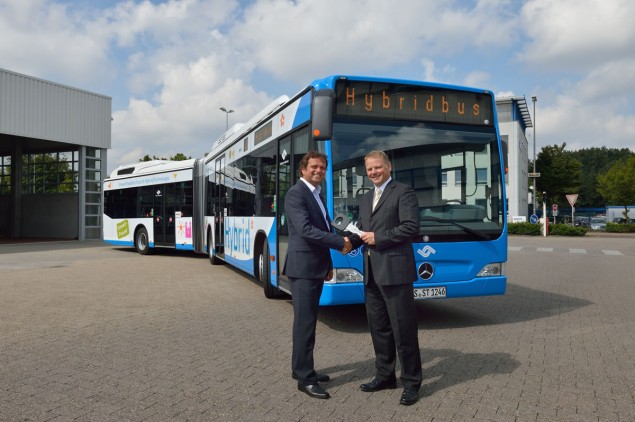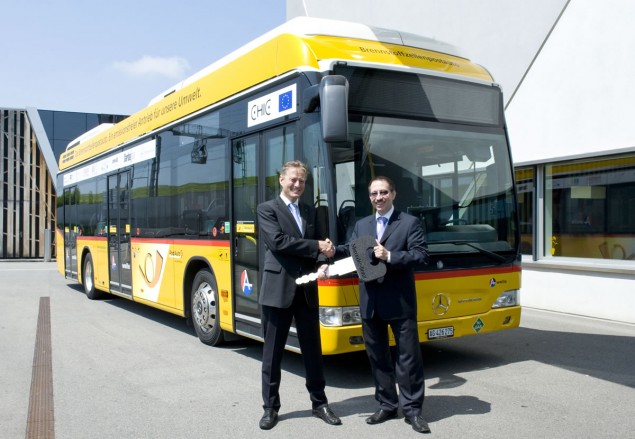Mercedes-Benz Hits Milestone on Mission to Create a Cleaner Earth
The countdown to zero emission buses has started
The countdown to zero emission buses has started: towards the end of next year, Mercedes-Benz will be starting series production of a city bus with all-electric drive system based on the international best-seller, the Mercedes-Benz Citaro.
“Our city bus produces zero local emissions and is ultra-quiet through town. The engineers are currently undertaking thorough testing of prototypes of the new bus under the toughest of conditions. As the technical concept, which involves a modular system for the power supply as well as optimised thermal management, makes clear: the Citaro with battery-electric drive will set a new milestone”, says Hartmut Schick, Head of Daimler Buses.

Der Citaro mit vollelektrischem Antrieb durchläuft zurzeit den gleichen umfangreichen Test- und Erprobungszyklus wie jeder andere Omnibus von Mercedes-Benz. Prototypen haben zum Beispiel erfolgreich eine erste Wintererprobung bei eisigen Temperaturen am Polarkreis und eine Sommererprobung in der Hitze der spanischen Sierra Nevada absolviert.
The Citaro with all-electric drive is currently being put through the same comprehensive cycle of trials and testing to which every other bus built by Mercedes-Benz is subjected. Prototypes have, for example, already successfully undergone initial winter testing in icy temperatures at the Arctic circle as well as summer testing in the heat of Spain’s Sierra Nevada.

Der Citaro mit vollelektrischem Antrieb durchläuft zurzeit den gleichen umfangreichen Test- und Erprobungszyklus wie jeder andere Omnibus von Mercedes-Benz. Prototypen haben zum Beispiel erfolgreich eine erste Wintererprobung bei eisigen Temperaturen am Polarkreis und eine Sommererprobung in der Hitze der spanischen Sierra Nevada absolviert.
The Citaro with all-electric drive is currently being put through the same comprehensive cycle of trials and testing to which every other bus built by Mercedes-Benz is subjected. Prototypes have, for example, already successfully undergone initial winter testing in icy temperatures at the Arctic circle as well as summer testing in the heat of Spain’s Sierra Nevada.

Der Citaro mit vollelektrischem Antrieb durchläuft zurzeit den gleichen umfangreichen Test- und Erprobungszyklus wie jeder andere Omnibus von Mercedes-Benz. Prototypen haben zum Beispiel erfolgreich eine erste Wintererprobung bei eisigen Temperaturen am Polarkreis und eine Sommererprobung in der Hitze der spanischen Sierra Nevada absolviert.
The Citaro with all-electric drive is currently being put through the same comprehensive cycle of trials and testing to which every other bus built by Mercedes-Benz is subjected. Prototypes have, for example, already successfully undergone initial winter testing in icy temperatures at the Arctic circle as well as summer testing in the heat of Spain’s Sierra Nevada.

Der Citaro mit vollelektrischem Antrieb durchläuft zurzeit den gleichen umfangreichen Test- und Erprobungszyklus wie jeder andere Omnibus von Mercedes-Benz. Prototypen haben zum Beispiel erfolgreich eine erste Wintererprobung bei eisigen Temperaturen am Polarkreis und eine Sommererprobung in der Hitze der spanischen Sierra Nevada absolviert.
The Citaro with all-electric drive is currently being put through the same comprehensive cycle of trials and testing to which every other bus built by Mercedes-Benz is subjected. Prototypes have, for example, already successfully undergone initial winter testing in icy temperatures at the Arctic circle as well as summer testing in the heat of Spain’s Sierra Nevada.
Modular design of battery packs allows range to be tailored
Mercedes-Benz celebrated production of the 50 000th Citaro just recently – but development of the world’s number one best-selling city bus continues apace. Hot on the heels of the recently introduced Citaro hybrid with its highly efficient diesel or gas-engine drive system comes the next step, the all-electric Citaro.
It receives its drive energy from lithium-ion batteries. The modular design of the battery pack means that individually customised solutions can be devised to match a wide range of applications and requirements in city traffic.
As well as the possibility of charging it from a power socket at the depot, Mercedes-Benz can also as an option supply the Citaro with one of a range of intermediate recharging solutions. The vehicle is powered by electric wheel hub motors at the rear axle, a system already proven over recent years in the Citaro G BlueTec Hybrid.
Thermal management reduces energy consumption dramatically
One of the particular features of the Citaro with all-electric drive will be the meticulously refined thermal management of the bus’s drive and climate control systems. This thermal management reduces energy consumption significantly and is tantamount to extending the range of the bus without changing the size of battery.
Successful testing in bitter cold as well as extreme heat
The Citaro with all-electric drive is currently being put through the same comprehensive cycle of trials and testing to which every other bus built by Mercedes-Benz is subjected. Prototypes have, for example, already successfully undergone initial winter testing in icy temperatures at the Arctic circle as well as summer testing in the heat of Spain’s Sierra Nevada. Endurance testing and detailed refinements will now follow, ensuring that Mercedes-Benz will be able to offer maximum availability on a par with that of a conventionally powered urban bus.
The Citaro with all-electric drive will celebrate its world premiere in September 2018 at the IAA Commercial Vehicles show in Hanover.
EBUS Award Given to the Citaro FuelCELL Hybrid Bus
the Citaro FuelCELL Hybrid won the EBUS Award, the environmental award for public local transport
In the fuel cell bus category, the Citaro FuelCELL Hybrid won the EBUS Award, the environmental award for public local transport. Roman Biondi, brand spokesman for Mercedes-Benz buses and EvoBus, and Ulrich Piotrowski, the Market Launch Manager for Mercedes-Benz hybrid and electric buses, accepted the award in Cologne on September 28, 2012 from Professor Ralph Pütz of the Landshut University of Applied Sciences, in the presence of Rainer Bomba, State Secretary at the Federal Ministry of Transport, Building and Urban Development.
Under the patronage of Dr. Peter Ramsauer, the Federal Minister for Transport, Building and Urban Development, the Forum for Transport and Logistics was offering the EBUS Award, the environmental award for public local transport, for the first time this year. “The EBUS Award recognises the efforts that have been made up to now to introduce electric buses into public local transport, and is intended as an incentive for everyone to drive forward further innovative developments in this sector”, said Professor Adolf Müller-Hellmann, chairperson of the Forum for Transport and Logistics, in his speech at the award ceremony.

The judges’ verdict
The fit-for-the-future drive concept in the Citaro FuelCELL Hybrid, which comprises the fuel cell, lithium-ion battery and electric motor, enabling the Mercedes-Benz city bus to travel over 300 kilometres without producing any emissions whatsoever, demonstrates that it is a worthy winner of the award. The judges particularly welcomed the use of a fuel cell that had already been deployed in the passenger car segment. Additionally, they said that the 17 Citaro FuelCELL Hybrid units already built emphasised the seriousness with which the development has been driven forward by Daimler Buses.

The FuelCELL concept in the Citaro
Thanks to improved fuel cell components (the fuel cell stacks are now identical to those in the Mercedes-Benz B-Class FCELL with fuel cell drive) and the hybridisation with lithium-ion batteries (27 kW/h), the new Citaro FuelCELL Hybrid delivers a 50-percent saving in hydrogen compared with the predecessor generation. As a result, it has been possible to reduce the number of tanks from the total of nine on board the fuel-cell buses deployed in earlier trials to seven, holding 35 kg of hydrogen in all. With the new FuelCELL Hybrid drive system, the fuel cell, as the electricity supplier, is intelligently linked to several components: to the battery, to the electric wheel hub drive and also to the integrated regenerative braking system. An internal combustion engine is now completely superfluous. The range of the fuel cell bus is over 300 kilometres, and the refuelling time is just eight to ten minutes. This means that the Citaro FuelCELL Hybrid can be deployed just as simply and flexibly as today’s diesel vehicles. What is more, the drive system and fuel cell are virtually maintenance-free and very long-lasting. With these diverse technical advances, buses running on electric power alone with fuel cells as energy generators are now a major step closer to production maturity. The Mercedes-Benz Citaro FuelCELL Hybrid opens the way to permanent emissions-free public local transport, making it a key element for future mobility. The use of synergies and the technology transfer from the passenger car to the bus make the fuel cell in the bus both fit for the future, and sustainably economical for the operator.
The EBUS Award, the environmental award for public local transport
The Forum for Transport and Logistics is a joint initiative of the DEVK insurance group and the VDV (Association of German Transport Companies). The EBUS Award is being offered for the first time, and is intended to publicise externally qualitative and innovative solutions in the field of electric buses. As well as the fuel cell buses category won by the Citaro FuelCELL Hybrid, awards were also presented for the categories hybrid buses, battery-driven buses, innovative components for buses with electric drives, operating concepts, instruction, education, and training and marketing measures. Scientific supervision was provided by Professor Dr. Dirk-Uwe Sauer from the Institute for Power Electronics and Electrical Drives at the research university of technology, the RWTH Aachen. It is planned to next offer the environmental award for public local transport in 2014.